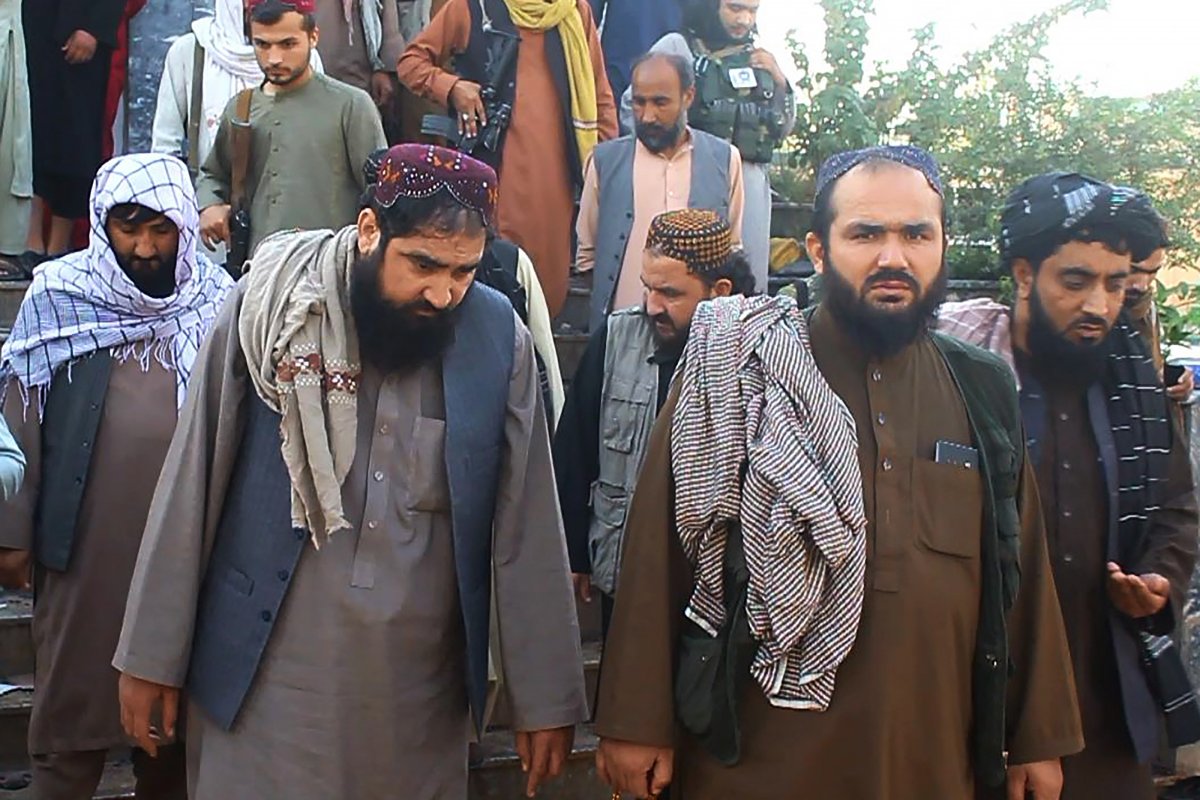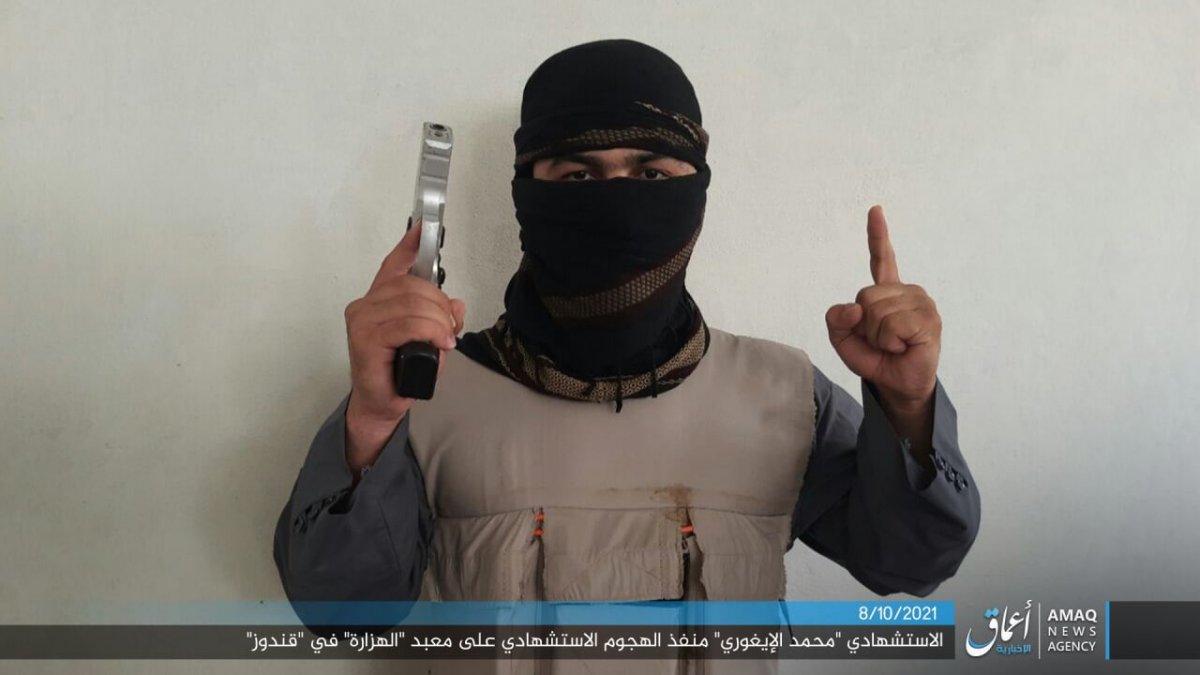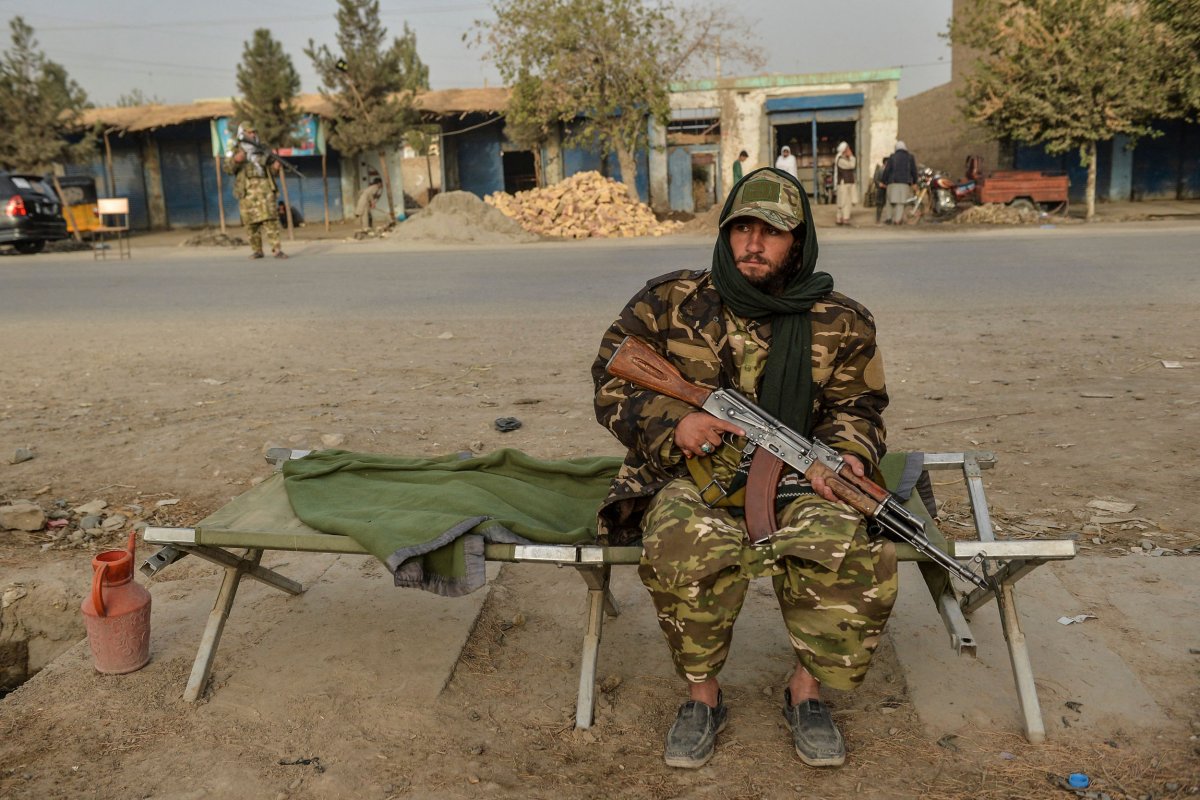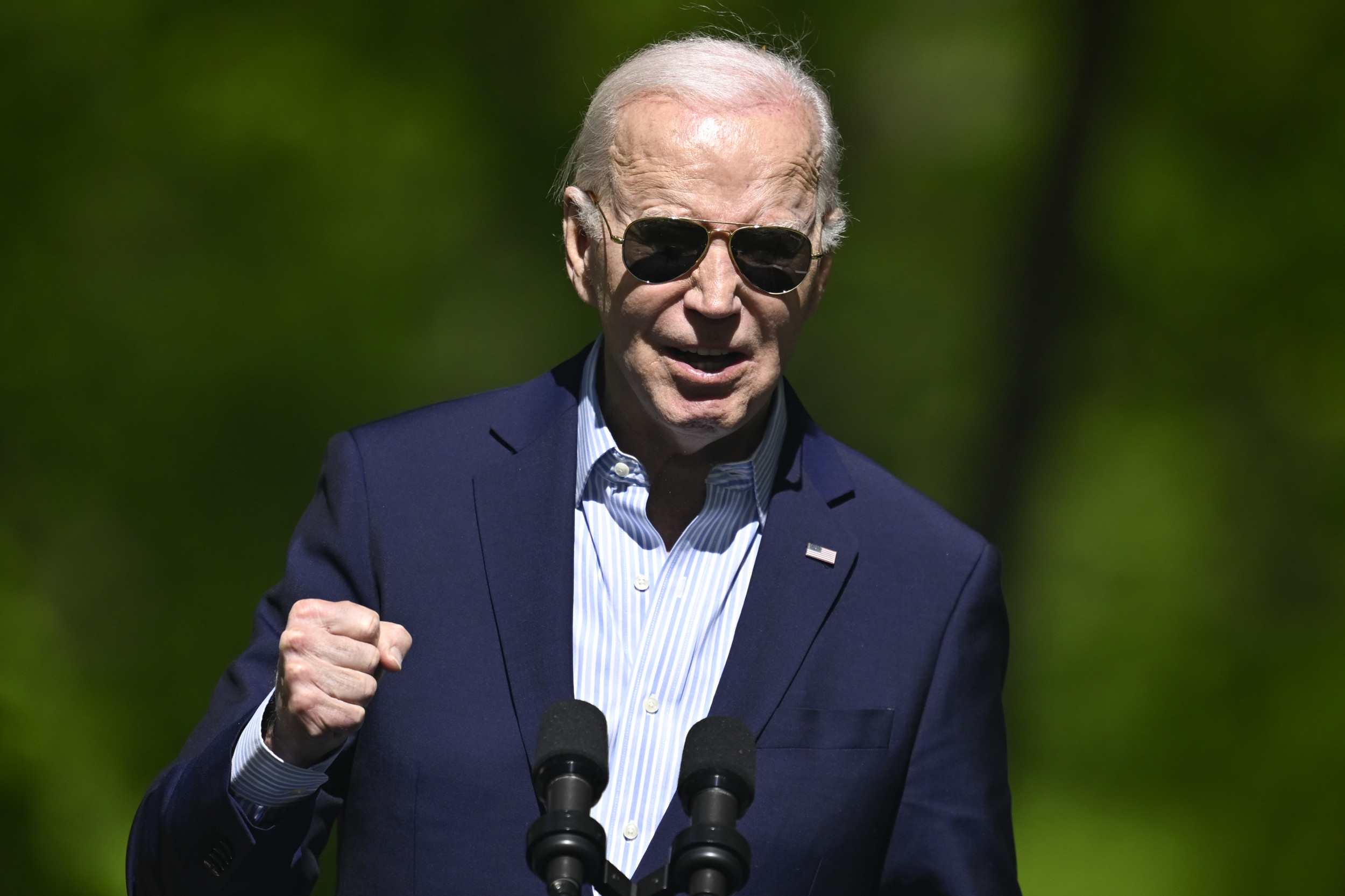The Taliban blames the United States for growing problems presented by the Islamic State militant group (ISIS) in Afghanistan, where a deadly rivalry has disrupted the early days of the newly declared Islamic Emirate.
Ahmad Yasir, protocol officer of the Taliban's political office in Qatar, is among the senior officials who are of the opinion that outside powers were to blame for ISIS' presence in Afghanistan, where an attack claimed by the jihadis against a Shiite Muslim mosque last week claimed the lives of dozens and injured hundreds more.
Asked by Newsweek if the ISIS threat had grown since the withdrawal of U.S. forces at the end of August and if the Taliban specifically blamed the U.S. for this increased threat, Yasir replied, "Yes, there is no doubt that the malicious hand is behind the ISIS attack."
And he argued that his group had evidence to prove this claim, though he declined to share at this date and time, saying such materials would be made available "in the future."
Also holding the U.S. responsible for the ISIS foothold was Qari Saeed Khosty, who handles social media responsibilities for the Taliban. He dismissed the notion that the group now in charge of Afghanistan would need to work with the U.S. to take on a common foe.
"The Islamic Emirate has no need for cooperation with anyone against ISIS, because ISIS does not have popular roots in Afghanistan," Khosty told Newsweek. "As you see, it was with American help and the help of the Kabul administration, that ISIS returned and grew."

The Taliban and ISIS are enemies with conflicting ambitions in their respective struggles.
The Taliban is rooted in Afghanistan, where the group emerged from the wake of a U.S.-aided mujahideen struggle against a Soviet intervention from 1979 to 1988. The conflict also gave birth to Al-Qaeda, which would take root in Afghanistan as the Taliban took control of much of the country until 2001, when the 9/11 attacks prompted a U.S.-led military campaign that dismantled the Taliban-led government.
The Islamic Emirate would return as an insurgency for the next 20 years until being reestablished as U.S. forces withdrew in August. Al-Qaeda, however, would spread elsewhere as the U.S. next invaded Iraq, toppling longtime leader Saddam Hussein and stirring a sectarian war that saw both Sunni and Shiite Muslim militias take up arms.
The most violent of these organizations was Al-Qaeda in Iraq, which declared the Islamic State of Iraq in 2006 and ultimately took advantage of a civil war in neighbor Syria to extend its presence there and rebrand as the Islamic State of Iraq and al-Sham, or the Levant, in 2013. The newly formed group known as ISIS established a self-proclaimed caliphate that comprised large parts of Iraq and Syria, drawing international condemnation.
The following year, the U.S. formed an international coalition and partnered with local forces to take on ISIS in both countries in 2014. Iran that same year mobilized local and regional forces to take on ISIS, and Russia then staged a direct military intervention in Syria during 2015.
But as ISIS was defeated in Iraq and Syria, a splinter Taliban faction formed a new group calling itself the Islamic State Khorasan province, or ISIS-K, in Afghanistan. Both the Taliban and the U.S. saw the group as a threat and Pentagon leadership has even acknowledged instances in which U.S. airstrikes against ISIS effectively assisted Taliban engagements on the ground.
While the U.S. military and the Taliban displayed an ability to cooperate directly during the chaotic airlift of foreign forces out of Afghanistan in August, ISIS also took advantage of the tumult to conduct a bloody suicide attack at the gates of Hamid Karzai International Airport. The bombing killed 13 U.S. soldiers and up to 170 Afghan civilians.
The Taliban said its members, too, were among the fallen and stepped up efforts against ISIS. The U.S. responded with airstrikes, including one that was said to have killed a senior ISIS commander, and another that was initially said to have killed another would-be attacker, but was ultimately acknowledged as having instead killed an Afghan aid worker and up to nine members of his family.
Though political contacts between U.S. diplomats and the Taliban continue in the Qatari capital of Doha, the Pentagon has said its efforts against ISIS-K remain limited to over-the-horizon (OTH) assets based outside of Afghanistan and that there was no direct line with Taliban commanders.
"While we continue to maintain OTH capabilities to counter terrorist activities in the region, we do not have any personnel on the ground in Afghanistan and have not been in communication with Taliban leadership," U.S. Central Command spokesperson Army Major John Rigsbee told Newsweek.
Rigsbee also underscored the position of President Joe Biden, who has repeatedly referred to ISIS-K as "the sworn enemy of the Taliban" and emphasized in August that it would benefit both the U.S. and the Taliban to not allow ISIS-K to grow in Afghanistan.
"Referring back to what the president has said in the past," Rigsbee said, "mutual interest exists and it's 'in the interest of the Taliban that in fact ISIS-K does not metastasize beyond what it is.'"
A State Department spokesperson also referred to Secretary of State Antony Blinken's remarks last month on the subject, along with those of the president.
"The Secretary has noted that, 'All of us have to remain vigilant and monitor threats, especially any reemergence of externally directed plotting, and address them swiftly when they arise,'" the State Department spokesperson told Newsweek. "As President Biden has made clear, the United States will maintain robust counterterrorism capabilities in the region to neutralize any threats, and we won't hesitate to use those capabilities if we have to do so."
"We have said we will work with the Taliban when and where it is appropriate and in our interest to do so; vanquishing ISIS-K is certainly in our shared interest," the spokesperson added.
A senior U.S. delegation met with Taliban officials on Tuesday and, while State Department spokesperson Ned Price declined to go into detail on the Taliban's position during a press briefing later that same day, he said counterterrorism "was a staple" of the discussion held between the two sides.

The narrative that the U.S. has contributed to the rise of ISIS-K in Afghanistan has gained ground among other longtime foes and even at least one U.S. ally.
In a speech delivered Monday in the wake of the deadly suicide attack in Kunduz, Secretary-General Hassan Nasrallah of Lebanon's Shiite Muslim Hezbollah movement said that "the United States must take responsibility" for ISIS' presence in Afghanistan.
He also accused the U.S. of having directly transferred ISIS militants from Syria to Afghanistan, an allegation also expressed Saturday by Turkish Foreign Minister Mevlut Cavusoglu, whose country is a member of the U.S.-led NATO alliance but has conflicting interests in Syria, during a press briefing in Venezuela.
No evidence has emerged of such U.S. transfers of ISIS fighters, though reports of such alleged activities have been frequently carried by outlets affiliated with countries and organizations critical of U.S. foreign policy in the Middle East. Nasrallah, for his part, argued that the U.S. sought to stoke unrest and civil war in Afghanistan, goals that run contrary to the official U.S. position.
"From our point of view, the Americans, the policies of the United States, the U.S. government, the U.S. military, the CIA and all those who deal with ISIS and Afghanistan are responsible for the innocent bloodshed in Afghanistan," Nasrallah said. "Today's Afghan authorities, whether recognized or not, have a responsibility to support other citizens, regardless of their religious, ideological or ethnic identity."
Both the U.S. and Iran, along with other powers such as Pakistan and Russia have joined the Taliban in condemning the ISIS-K-claimed attack in Kunduz.
With foreign forces having left Afghanistan, however, the State Department spokesperson said it's up to the Taliban to lead the charge against its foe.
"ISIS-K has committed despicable attacks of violence on innocent Afghans, including women in labor, newborns, schoolgirls, and minorities," the State Department spokesperson said. "It is clearly in the Taliban's interest moving forward to focus their efforts on eliminating this virulent terrorist group."
"Now is the time for the Taliban to show their commitment to not allow Afghan soil to be used by ISIS-K or any other terrorist group that threatens the security of the United States or its allies, and certainly not innocent Afghans for that matter," the spokesperson added.

Uncommon Knowledge
Newsweek is committed to challenging conventional wisdom and finding connections in the search for common ground.
Newsweek is committed to challenging conventional wisdom and finding connections in the search for common ground.
About the writer
Based in his hometown of Staten Island, New York City, Tom O'Connor is an award-winning Senior Writer of Foreign Policy ... Read more
To read how Newsweek uses AI as a newsroom tool, Click here.








